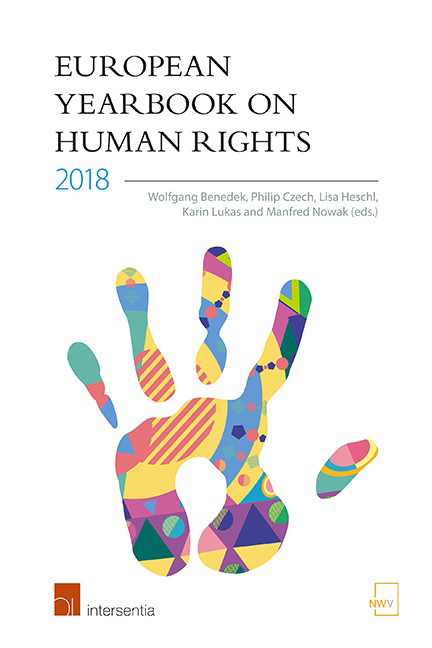Book contents
- Frontmatter
- Scientific Advisory Board
- Editors’ Preface
- Contents
- List of Abbreviations
- List of Contributors
- Part I Topic Of The Year
- Part II Eu
- Part III Coe
- PART IV OSCE
- Part V Others
- Part VI Book Reviews
- Katja S. Ziegler, Elizabeth Wicks and Loveday Hodson (eds.): The UK and European Human Rights – A Strained Relationship?
- Emily Reid: Balancing Human Rights, Environmental Protection and International Trade – Lessons from the EU Experience
- Nicole Bürli: Third-Party Interventions before the European Court of Human Rights
- Stijn Smet and Eva Brems (eds.): When Human Rights Clash at the European Court of Human Rights – Conflict or Harmony?
- Violeta Moreno-Lax: Accessing Asylum in Europe, Oxford Studies in European Law
- Mark Dawson: The Governance of EU Fundamental Rights
- Philip Leach: Taking a Case to the European Court of Human Rights, 4th Edition
- Sionaidh Douglas-Scott and Nicholas Hatzis (eds.): Research Handbook on EU Law and Human Rights
- Lauri Mälksoo and Wolfgang Benedek (eds.): Russia and the European Court of Human Rights – The Strasbourg Effect
- Index
Stijn Smet and Eva Brems (eds.): When Human Rights Clash at the European Court of Human Rights – Conflict or Harmony?
from Part VI - Book Reviews
Published online by Cambridge University Press: 31 January 2019
- Frontmatter
- Scientific Advisory Board
- Editors’ Preface
- Contents
- List of Abbreviations
- List of Contributors
- Part I Topic Of The Year
- Part II Eu
- Part III Coe
- PART IV OSCE
- Part V Others
- Part VI Book Reviews
- Katja S. Ziegler, Elizabeth Wicks and Loveday Hodson (eds.): The UK and European Human Rights – A Strained Relationship?
- Emily Reid: Balancing Human Rights, Environmental Protection and International Trade – Lessons from the EU Experience
- Nicole Bürli: Third-Party Interventions before the European Court of Human Rights
- Stijn Smet and Eva Brems (eds.): When Human Rights Clash at the European Court of Human Rights – Conflict or Harmony?
- Violeta Moreno-Lax: Accessing Asylum in Europe, Oxford Studies in European Law
- Mark Dawson: The Governance of EU Fundamental Rights
- Philip Leach: Taking a Case to the European Court of Human Rights, 4th Edition
- Sionaidh Douglas-Scott and Nicholas Hatzis (eds.): Research Handbook on EU Law and Human Rights
- Lauri Mälksoo and Wolfgang Benedek (eds.): Russia and the European Court of Human Rights – The Strasbourg Effect
- Index
Summary
Some cases at the European Court of Human Rights (ECtHR, the Court) appear to be impossible to be justly resolved: Should the Court either deny maternity, by deciding to destruct the frozen embryos against the wishes of the woman who contributed her ovum, or force paternity against the will of the applicant‘s former partner? The ECtHR dealt with this question in the Evans v The United Kingdom case, which entails a conflict between human rights, namely a ‘ conflict between the Article 8 rights of two private individuals ‘ (para. 73). Also, Ladele v The United Kingdom, Axel Springer AG v Germany and Fernández Martinez v Spain are just some additional examples of cases at the Court which encompass conflicts between Convention Rights. However, there is little literature covering possible human rights conflicts and the existing literature with its different approaches is widely scattered, making it difficult for practitioners to get a profound overview. The book When Human Rights Clash at the European Court of Human Rights: Conflict or Harmony?, composed of contributions by different renowned authors, with the editors Stijn Smet and Eva Brems leading the way, is a compelling compendium of various approaches to tackle not only the resolution of human rights conflicts but also the very possibility of their existence. The book is divided into two parts, with the first part (pp. 23) setting out different theoretical approaches and the second part (pp. 75) resolving the four cases, mentioned at the beginning of this review, which form the ‘ analytical backbone ‘ of the book (p. 2). While some might criticise that this work is a mere collection of separate papers by different contributors, it must be emphasised that it is a coherent whole with the four cases running like a common thread through all the separate chapters. In the second part of the book, each of the four cases is discussed in two chapters from a different angle by two authors, which leaves the reader the impression of a comprehensive resolution of the human rights conflict each case entails.
- Type
- Chapter
- Information
- European Yearbook on Human Rights 2018 , pp. 607 - 608Publisher: IntersentiaPrint publication year: 2018



